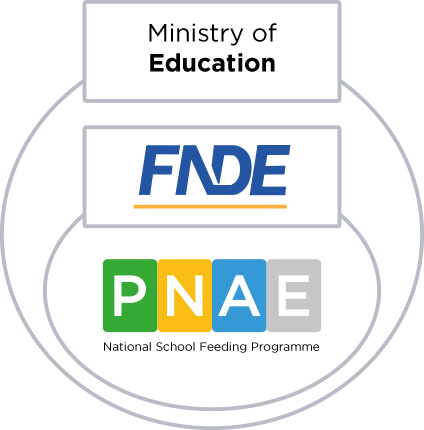PNAE: Structure, guidelines and operation
School feeding actions began around 1930 and evolved until the current Brazilian National School Feeding Programme (PNAE). We discuss and, at times, emphasize some issues related to its history so you can better understand the way in which the Programme has been structured and how smallholder farming was inserted within it, as well as the benefits achieved with such action.

Structure

To understand important aspects related to smallholder farming in the PNAE context, we need to learn a bit more about the Programme in the present.
FNDE: National Fund for the Development of Education
The FNDE, a federal autonomous agency of the Ministry of Education (MEC), is responsible for ensuring the right to school feeding by means of a supplementary transfer of financial resources to states, municipalities and the Federal District. It is up to the FNDE to calculate financial values to be granted, to obey by the establishment of rules, and to evaluate the National School Feeding Programme´s (PNAE) operation.

FOOD FOR THOUGHT
Do you know how these jurisdictions, that are not states, municipalities and the Federal District, act upon this context?

Executive Entity
State, municipality, Federal District and federal schools, responsible for the PNAE operation, including the use and addition of financial resources granted by the FNDE, the Programme´s accountability, the offer of school feeding for at least 800 hours of classes, distributed in at least 200 (two hundred) days of school work, and the food and nutrition education actions to all enrolled students.
Within these government jurisdictions, responsible for the PNAE operation, there are also the Executive Units (UEx).
FOOD FOR THOUGHT
Do you know what would be the role of these Executive Units (UEx) in the PNAE, as the financial resources are already transferred directly from the FNDE to the Executive Entities (EEx)? What institutions can be Executive Units?

Executive Entity (UEx)
The Executive Unit does not receive resources directly from the FNDE. It operates when the Executive Entity (EEx) chooses to decentralize the management of school feeding resources.
- Executive Unit is a non-profit private entity that represents the school community and is responsible for the reception of financial resources transferred from an Executive Entity (EEx) in favour of the school it represents, as well as the Programme´s accounts provision to the organization that delegated it.
School Feeding Council (CAE)
Following this sequence, we also present the School Feeding Council (CAE), which is a supervisory, permanent, deliberative and advisory collegiate organization established in the states, the Federal District and the municipalities and composed of, at least, 7 (seven) full members and their respective substitutes.
Take a look at how this collegiate is composed.

Other partnerships
The FNDE and the PNAE are aided by other organizations to reach their goals.
- The Federal Court of Accounts (TCU) and the Ministry of Transparency of the Comptroller General of Brazil (CGU): Controlling organizations;
- Public Ministry (MP): Responsible for verifying denunciations;
- Secretariats of Health: Responsible for the sanitary inspection of food;
- School Feeding Councils: Control the application of transferred resources and watch over the quality of goods, from their purchase to distribution at schools, always paying attention to good sanitary and hygiene habits.

Participation of smallholder farming in school feeding
Connection steps established between the PNAE´s EEx and farmers for the acquisition of foodstuffs from smallholder farming to school feeding.
